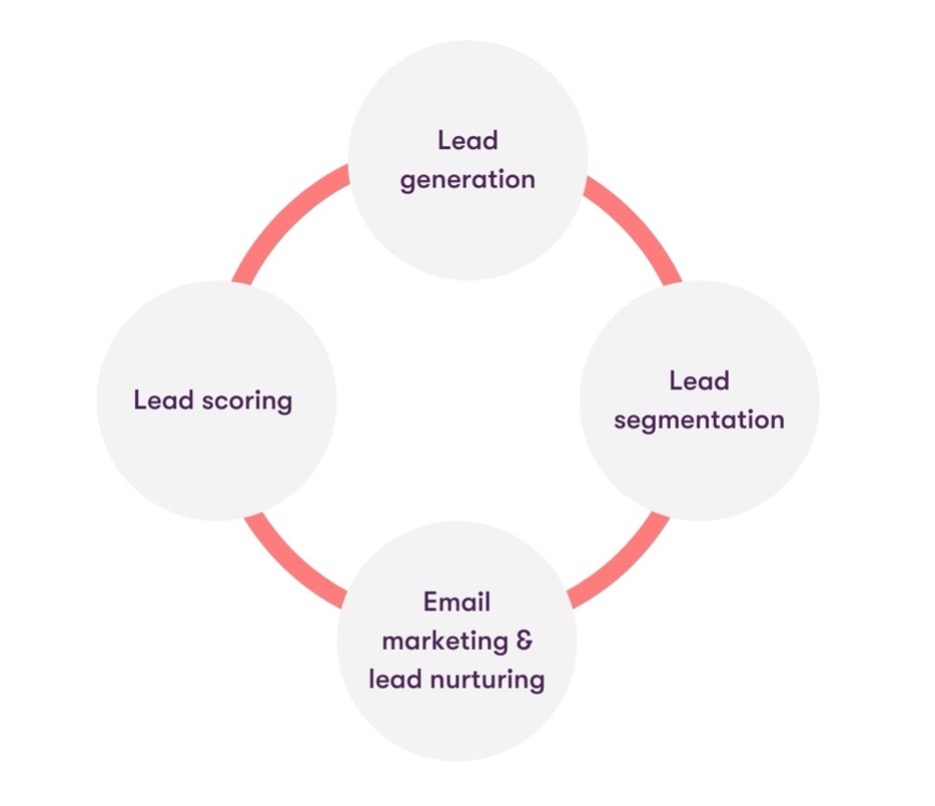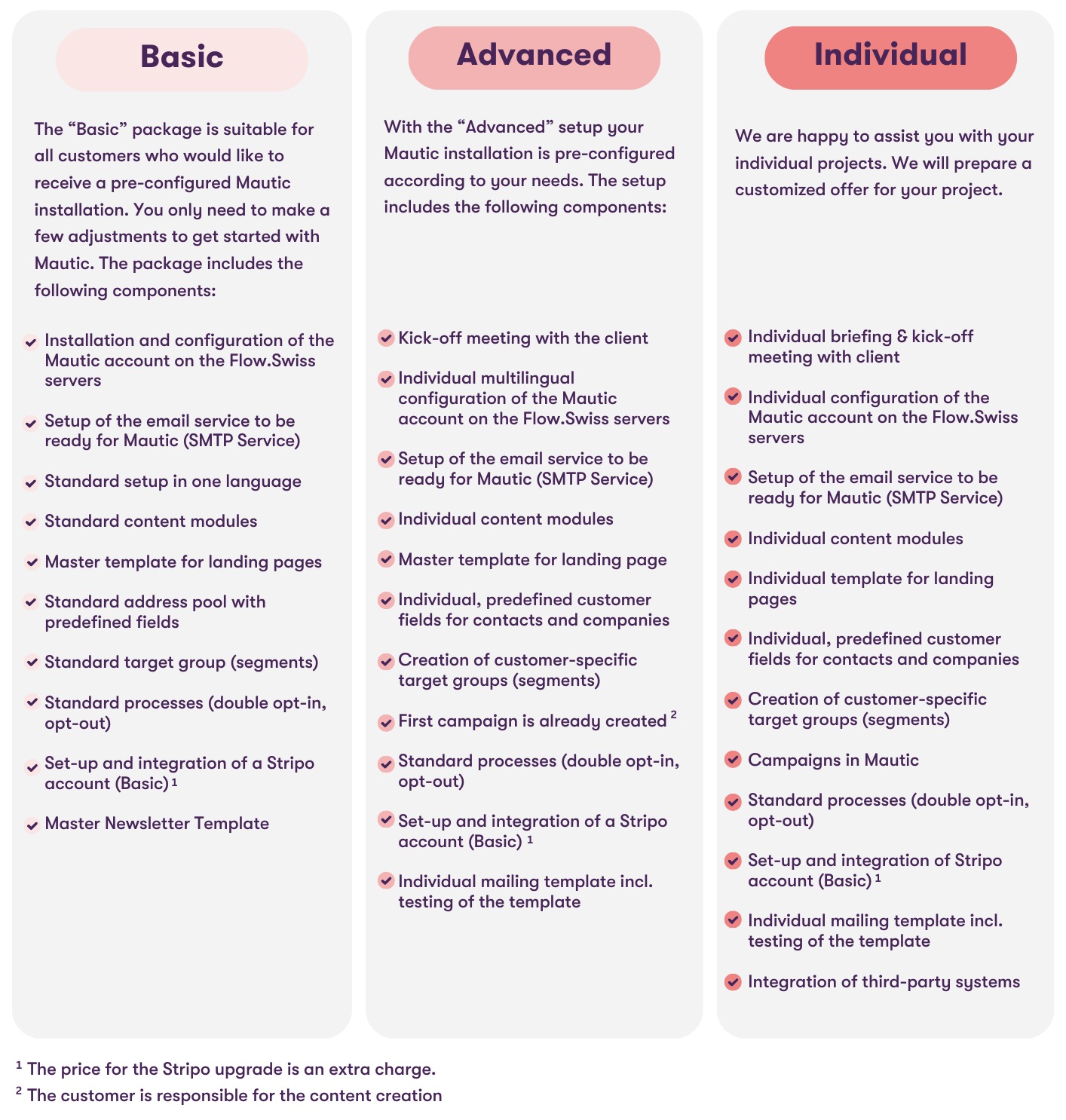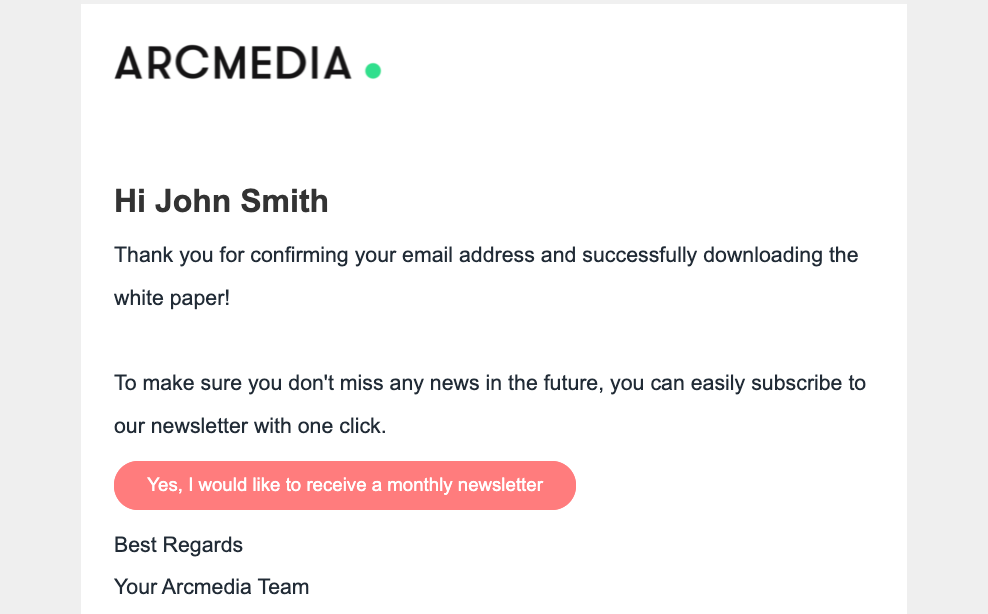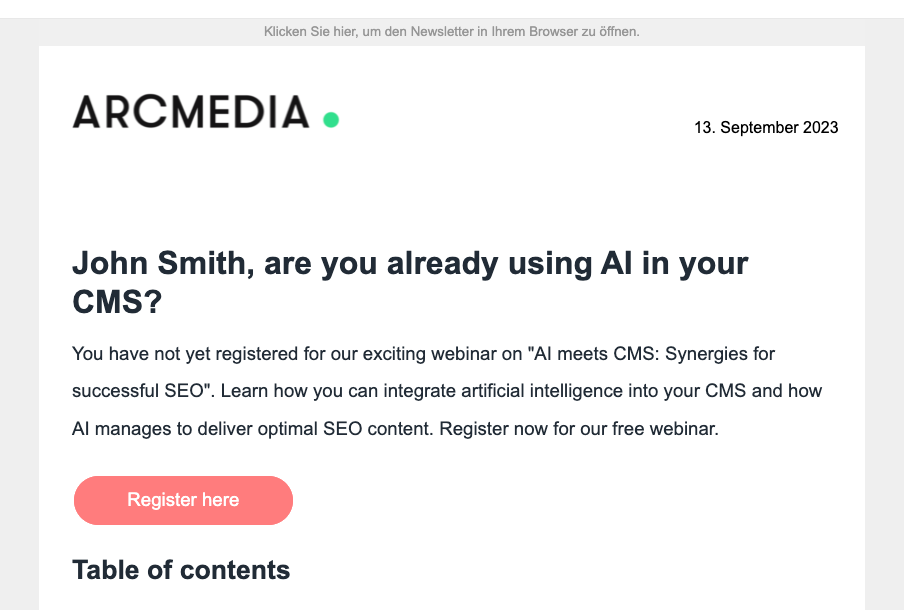Do you already understand the full potential of marketing automation? Even in today's digital marketing age, many business owners are still unsure of what marketing automation is and what it can do. In this blog post, we'll take a closer look at what marketing automation is all about: where it can be used, the tools you can use, what you need to consider when implementing it, and some best practices from digital marketing agency Arcmedia. We'll show you exactly how you can successfully shape the future of your marketing with a marketing automation tool. Let's dive in together!
What exactly is marketing automation?
The goal of marketing automation is to make marketing tasks more efficient while strengthening relationships with potential and existing customers. Marketing automation automates routine tasks that are often neglected due to time constraints.
But in a field as interpersonal as marketing, how can 'automation' actually help to engage and interact with customers?
It is important to understand that marketing automation does not replace human interaction, but intelligently supports it. Especially in B2B, where personal relationships are often crucial to a successful deal, marketing automation does all the groundwork. It identifies leads at an early stage and guides them through the customer journey. This extends reach and ensures that prospects are never missed.
So why is marketing automation so important? Here are some of the key benefits:
-
Save Time: By automating repetitive tasks, marketing teams can spend more time on strategic planning and creativity.
-
Cost efficiency: Automation reduces the need for manual labour hours, which in turn reduces costs.
-
Improved lead generation: Marketing automation makes it possible to identify and nurture prospects more effectively.
-
Personalisation: By collecting data, marketing messages can be more personalised and targeted.
-
Optimised data analysis: Automated tools provide detailed insights into campaign performance, enabling informed decisions to be made.
Where is marketing automation being used?
Marketing automation is undoubtedly a powerful tool that offers many opportunities for companies to improve their marketing processes. However, marketing teams are often reluctant to implement marketing automation because of common myths that paint marketing automation in the wrong light.
A common misconception is that automation is only suitable for email marketing and that it is impersonal, leading potential customers to perceive automated messages as spam. In reality, it is much more versatile and subtle.
Here we look at some of the areas where marketing automation can be used:

Lead generation:
Marketing automation can make all the difference in the lead generation phase. Call to actions, contact forms and landing pages guide visitors through the conversion process. The process is simple: prospects land on your blog post and click on your call to action button. They are then taken to your landing page, enter their contact details and are given access to the information they want. This process automatically converts your visitors into leads and adds them to your database.
Lead segmentation:
Once leads have been captured in your CRM database, they can be automatically segmented into different categories. This can be based on criteria such as content downloaded, propensity to buy, demographics or interactions with your content. This segmentation allows you to better target your marketing messages and send them to the right prospects. For example, you can send an information brochure only to prospects who have already viewed your product.
Email marketing und lead nurturing:
Once visitors become leads, they can be of great interest to your marketing team. Not every lead is immediately ready to buy your product or service. This is where lead nurturing comes in. Using automated email marketing, you can send personalised emails to keep your leads in the loop, giving them tips and alerting them to new content.
Lead scoring:
A lead scoring workflow automatically scores your leads. This is based on their activity and progress through the buying process, with them receiving points or being placed in specific stages depending on their actions. This automated scoring allows you to qualify leads for further follow-up and ultimately pass them on to your sales team.
As it turns out, marketing automation is much more than just automated emails. It is a powerful tool that can optimise your marketing activities in a number of ways. In the following sections, we will look at these aspects in more detail and show you which marketing automation tools you can use to implement these activities.
Which marketing automation tools are on the market?
There are many marketing automation tools on the market that you can use to automate your marketing activities. Here is a brief look at some of the leading tools:
Mautic
Mautic is an open source platform that allows companies to fully customise their marketing automation. With Mautic, you can send personalised emails, create landing pages, capture and segment leads, and generate detailed reports on the performance of your campaigns. Mautic's open source environment allows you to customise and extend the platform to meet your individual needs.
Mautic is unique in its flexibility and adaptability. It allows companies to tailor their marketing processes to their specific needs without being tied to proprietary solutions. Mautic is therefore a cost-effective way to implement marketing automation in your organisation and benefit from the advantages of this advanced technology. In the Marketing Automation Best Practices section we show you examples of how Mautic can be used.
HubSpot
HubSpot is a holistic inbound marketing platform that provides tools for content marketing, email marketing, social media management, CRM and more. In addition to automating your marketing activities, HubSpot enables you to generate and nurture leads and seamlessly integrate marketing and sales.
Marketo
Marketo, now part of Adobe, is a powerful marketing automation tool for businesses of all sizes. It offers comprehensive capabilities for creating personalised marketing campaigns, tracking prospects and running lead nurturing programmes.
Mautic, HubSpot and Marketo are just a few of the many marketing automation tools on the market. Choosing the right tool depends on your specific needs, budget and goals. It is important to do your research and compare options to find the best fit for your business. It is also a good idea to test the tool with a demo version. You can do this free of charge with Mautic, for example.
The implementation of a marketing automation tool
If you decide to implement a marketing automation tool, you have already taken the first step towards more effective and efficient marketing. But before you make that decision, you need to make sure your organisation is ready for the technology. Successful implementation requires a clear strategy and an understanding of how your marketing department and other departments will work together. The following steps can help guide your implementation:
1. Set clear goals
Before implementing a marketing automation tool, it is important to set clear goals and expectations. What outcomes do you want to achieve? What processes do you want to automate? A clear understanding of your goals will help you choose the right tool and develop your strategy.
2. Deciding on a marketing automation tool
When choosing a marketing automation tool, it's important to fully research what's available before you buy. Many tools offer different packages that vary in their scope of services. For example, the following packages are available for Mautic from Arcmedia

3. Provide resources
Implementation requires time, money and staff. Make sure you have the necessary resources to set up and use the tool successfully. This may include training your team and, for example, bringing in experts from a digital marketing agency to administer the software.
4. Ensure data quality
It takes a lot of data to make a marketing automation tool work. Make sure your company data is clean, up-to-date and accurate. Also be aware of the provisions in the various data protection laws to which you are subject.
5. Develop a strategy
Consult a digital marketing agency for a clear marketing strategy that includes the use of the tool. The experts will support you in defining target groups, developing automated workflows and planning content.
6. Education and training
Ensure that your team has the necessary know-how to use the tool effectively. Invest in training and educational materials to ensure your team can realise the full potential of your marketing automation tool.
7. Integration
Make sure the tool integrates well with your existing system landscape, especially your CRM system. Smooth integration is important for seamless data exchange and efficient management of leads and customer information.
8. Test and optimise
After implementation, it is important to test and continually optimise your campaigns and workflows. Analyse the performance of your chosen marketing automation tool, identify weaknesses and adjust your strategy accordingly.
Implementing a marketing automation tool can take your marketing activities to a new level, but it requires careful planning and preparation. With the right strategy and the necessary resources, you can take full advantage of this powerful technology.
Best practices for marketing automation
Marketing automation supports marketing teams in their day-to-day work and enables them to complete their tasks efficiently. The following best practices show how marketing automation can be used in a variety of ways:
Acquire new customers
The moment a potential customer visits your website and expresses interest in your products or services, signs up for your newsletter or downloads a whitepaper, lead nurturing begins. In practice, this means that Mautic sends welcome emails with further information to the interested parties.

The example shows an automatic follow-up email after a prospect has downloaded a white paper. Mautic then sends a confirmation email with a personalised message inviting the prospect to subscribe to the newsletter.
Stay in touch with existing customers
When leads become customers, your marketing is far from complete. The relationship with existing customers also needs to be continually nurtured. Mautic's marketing automation tool allows you to do this with personalised follow-up emails that recommend similar products or inform about news.
An example: If you regularly send out relevant newsletters about events to your customers, you can use Mautic's segmentation to personalise them and, more importantly, send them to the right audience. In addition, event invitations can be sent to customers who have not yet registered for the event and may be interested in attending.

Conclusion
In this blog post, we took a closer look at what marketing automation is and how it can revolutionise your marketing efforts. From increasing process efficiency to strengthening customer relationships, marketing automation offers a wide range of benefits. You can save time and money, improve lead generation, send personalised messages and make informed decisions based on data analysis.
Furthermore, the versatility of marketing automation goes beyond automated emails and offers many possibilities in areas such as lead generation, segmentation, email marketing, lead nurturing and lead scoring. Mautic is a promising solution for this.
If you want to learn more about marketing automation and are ready to automate your marketing activities, don't hesitate to contact Arcmedia. We offer a free demo of Mautic so that you can try out the platform and see for yourself how a marketing automation tool can take your marketing to the next level. Click here to contact us.








